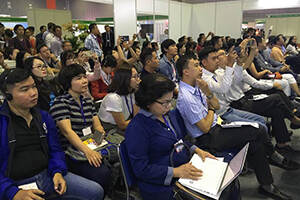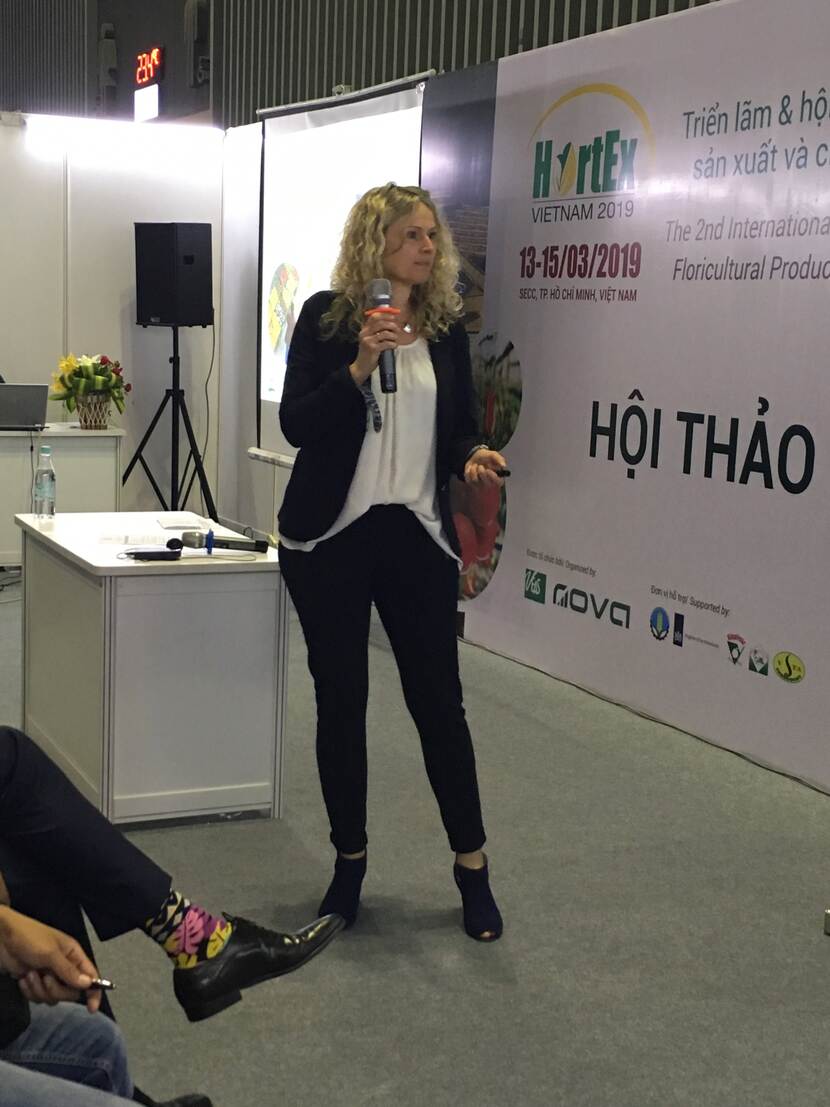Boosting agro-food transitions in Vietnam
On March 15 more than 100 people – mainly from fruit & vegetable and logistic companies - attended the seminar ' Opportunities of Circular Agro-Food Value Chains: Boosting the transition! ' in Ho Chi Minh City. They discussed on how Vietnam can boost circular agro-food value chains and reduce losses and waste. The seminar was co-organized by the Postharvest Network, the Embassy of the Netherlands in the frameworks of HortEx Vietnam 2019 and powered by Wageningen University & Research and other Dutch, Vietnamese partners.

Heike Axmann (project leader Supply Chain Management Group and coordinator of the Postharvest Network, Wageningen University & Research): "Food losses and waste in Vietnam are above the global average; recent publications talk for instance about 60% losses and waste in fresh fruit and vegetables. Globally this is estimated to be 45%. Less losses and waste can translate to less hunger but also to interesting business opportunities for all chain partners."
Moving from the current 'push market approach' to a 'pull market approach' can bring many positive changes to Vietnam.
From push to pull market
Axmann explained the principals of circular chains, 'no waste' and 'no feed and food competition' and new pathways for Vietnam in this relation. "The first focus should be prevention of losses and waste, then reduction, and only then valorisation. Moving from the current 'push market approach' to a 'pull market approach' can bring many positive changes to Vietnam. Instead of farmers producing crops without knowing the requirements of the market, in a 'pull market approach' demand and supply are matched."

Other combat strategies
"Next to the change of the drivers in the chains, there are also other combat strategies towards zero waste, sometimes developed elsewhere. Post-Harvest technology, agro-logistics, seamless cold chains, processing, use of side streams for feed or material, and novel technologies are all important."
Task forces
"Collaboration with experienced parties in this domain therefore can boost the transition. A learning from the Netherlands is that initiatives to reduce food losses and waste can best be aligned to high-level task forces, set quantitative targets and monitor the progress. In the Netherlands a national platform called 'United against Food Loss & Waste' has been established with strong support of the Ministry of Agriculture, Nature and Food. Their aim is to reduce food waste in 2030 with 50%."
Summary of the seminar program
Carel Richter (consul general of the Embassy of the Netherlands opened the seminar by explaining the importance of circular chains. Willem Schoustra (Agricultural Counsellor of the Embassy of the Netherlands and chairman of the day) pointed out that farmers and powerful collaboration are key in chains: "Together new business opportunities can be opened up."
Nguyen Phuc Dang (secretary general of Vinafruit) talked about the current situation of their members. Farmers and exporters have to cope with high market requirements and competition from foreign businesses. For Vietnam - a relatively young export nation - it's not easy to remain competitive and respond timely and adequately to the strict requirements of export markets.
According to Khoa Dao Trong (vice-president of Vietnam Logistic Association) cold chain development in Vietnam is still in an early stage. The refrigerated warehouse capacity in this country is about the half of that in Mexico (both per person as well as with regard to the total capacity). According to data from 2016-2018 Vietnam scores the lowest compared to the refrigerated warehouse capacity in countries like Mexico, Indonesia, Brazil, China, India, and USA. Hardware capacity, but also along gaining knowledge and experience can boost the development.
Julie Ly (marketing & sales manager of Control Union Vietnam) explained that to boost circularity we can look at the many proven principals used in the organic agriculture. For example composting, bringing organic matter back into the soil rather than using chemical fertilizers or burning field residuals.
Ant Farms has been setting up export chains for dragon fruit and sweet potatoes. Nguyen Thanh Trung (owner and managing director of Ant Farms) explained that they suffer from the lack of knowledge and experience in Vietnam in relation to post-harvest and proper storage facilities. In their chains, therefore, serious post-harvest losses occur and the storability of sweet potatoes is short and a lot of crop get lost whereas in other places in the world sweet potatoes can have a storage life of 6-10 months under optimal conditions.
In case you have more question ask our expert Heike Axmann MSc at e-mail: Heike.axmann@wur.nl
Content Source: Postharvest Network, Wageningen University & Research.
Please also check out for more information about the Seminar on the clip from Ho Chi Minh city television subtitled by the Netherlands Embassy in Vietnam :